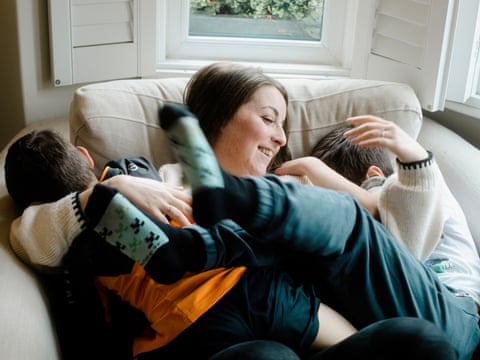Most people with small children are worn out – but for some, the pressure of striving to be perfect parents can drive them to the edge. ‘I cried like someone had died,” Rachel Stern says of the day things unravelled at home. “I thought: ‘I can’t do this any more.’ I didn’t want to spend time or play with my children. I was just going through the motions.”. It was a Sunday morning in January 2022. Stern’s sons were five and two. She wrote her husband a note – “I just need some space” – asking him to watch them, left their home in Manchester and started walking. “I was inconsolable,” says Stern, now 39. “And it was so shameful to admit that I just couldn’t be with my kids.”.
![[Pictured in her kitchen with her two children is Rachel Stern, a mother who suffered from parental burnout]](https://i.guim.co.uk/img/media/72e9e5def73ff56ec36592862d7f438e0160a46f/0_0_6000_4500/master/6000.jpg?width=465&dpr=1&s=none&crop=none)
Stern was working condensed, full-time hours in a new job as a brand strategist. The family had moved cities during the pandemic, bought and renovated a house, and her eldest had started school four months earlier. She had reached her limit: “I didn’t have the mental capacity to be a mum any more.” She now understands that she was suffering from parental burnout, a syndrome defined by academics as “chronic and overwhelming stress which leads parents to feel exhausted and run down by their role”. At its worst, it can give rise to thoughts of suicide – more so, say researchers, than in cases of job burnout or depression.
In a busy, perfectionist world, in which parents are trying to be the very best at home, at work and within their wider families, the term has gained traction, and is the subject of academic study at the Parental Burnout Research Lab at the University of Louvain in Belgium. Run by academics Moïra Mikolajczak and Isabelle Roskam, the lab has gathered evidence from 30,000 parents worldwide and has created a 23-point questionnaire to help people determine whether their feelings are, overall, balanced or whether there’s cause for concern. Is parental burnout an inevitable symptom of the impossibility of doing and having it all – or a worrying condition we should be taking more seriously?.
“In reality, it had been going on a long time,” says Stern, who had “always wanted to be a mum” but found her first maternity leave more challenging than she had imagined. “I found the monotony hard. Among other mums, I was the anomaly, saying, ‘I’m not enjoying this, I want to go back to work.’” She then found the jump to two children “unbelievably hard. I’d wanted to give my son a sibling but I’d be on my own with these children all day while my husband worked, and I dreaded it. I was clock-watching. It was constant: ‘I can’t do this, I can’t cope.’”.
After stepping out of her front door that Sunday morning, she walked the streets for a while before ending up at her parents’ house. She saw a GP, followed by a psychologist, who diagnosed acute stress. She took nine months off work. “My husband had always been hands-on but he picked up more. He did bath and bedtimes or our parents helped. I couldn’t be left alone with the kids, not because anyone feared for their safety; they feared what it would do to me.”.
Through reading books, researching online what she was feeling and listening to podcasts during that time, she stumbled across the term “parental burnout”. “It was a lightbulb moment,” she says. The term was conceptualised by Roskam and Mikolajczak. Roskam, who herself has five children, noticed a pattern in her clients. “I saw parents coming to a consultation talking about themselves, how they were suffering. Moira wondered: ‘Is there something similar to burnout, but in parents?’” Academically, the term emerged in the 1980s but had only ever been considered in families with severely ill or disabled children. But the pair’s research has found it to be more widespread. Their diagnostic test includes practical questions about whether parents feel they have anyone to share the load with, as well as emotional ones about how much they feel able to handle stress. “We applied a scale, like in job burnout, changing the features to parenting situations.”.
The syndrome presents as extreme exhaustion and emotional distancing. Roskam describes a “cold parenting, autopilot mode”; a feeling of no longer wanting to parent or getting pleasure from it; and, critically, a sense of not measuring up to the parent they want to be, leading to intense feelings of shame and guilt. Is this different from the everyday fatigue of raising children? Yes, Roskam says. “Every parent feels exhausted at the end of the day, whether you have a lot of children or your children are young; and every parent feels happy once they’re in their beds at night and you have some time for you. But if the next day you wake up with your energy replenished and you are able to see your children and be involved in parenting them again, you are not in burnout. You are, though, if, even with a long and good night’s sleep, you are not able to recover or feel good in your parenting role. It’s not a normal exhaustion but an intensity of overwhelming exhaustion far beyond anything you’ve imagined. You wake each morning already exhausted at the thought of what to do for or with the children.” Parents who are in burnout will also feel they have lost direction, can no longer stand their “mum” or “dad” role and are only able to do the bare minimum for their children.































